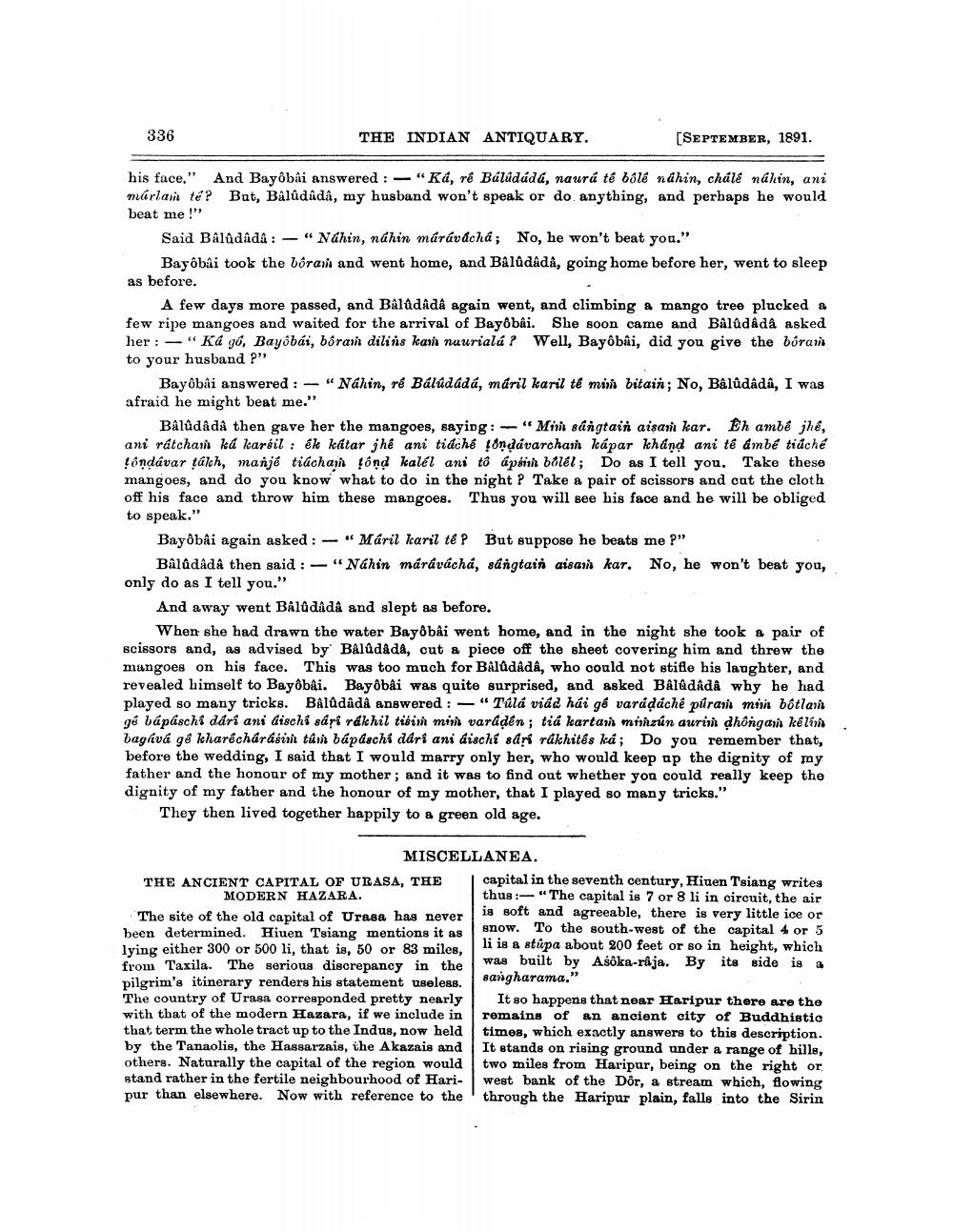________________
336
THE INDIAN ANTIQUARY.
[SEPTEMBER, 1891.
his face." And Bayôbâi answered: -"Ká, rê Bálúdádá, naurá té bálé náhin, chalé náhin, ani márlai té? But, Balûdada, my husband won't speak or do anything, and perhaps he would beat me !"
Said Baladada : - “ Nahin, náhin máráváchá; No, he won't beat you."
Bayobai took the bóraxi and went home, and Balûdada, going home before her, went to sleep as before.
A few days more passed, and Balûdêdê again went, and climbing a mango tree plucked a few ripe mangoes and waited for the arrival of Bayôbâi. She soon came and Balûdâdå asked her : -“Ka gó, Bayóbái, bórari dilins kari naurialú? Well, Bayôbâi, did you give the bórain to your husband ?"
Bayôbâi answered: - "Nahin, rê Bálúdada, maril karil tê min bitain; No, Bâlûdâda, I was afraid he might beat me."
Bâlûdâ då then gave her the mangoes, saying:-"Miri sángtain aisar kar. Eh ambe jhé, ani ratchani ka karsil: ek katar jhe ani tidché ondávarchar kápar khand ani té ámbé tidché fôndávar tálch, manjé tilchain fond kalel ani tô ápáir bölel; Do as I tell you. Take these mangoes, and do you know what to do in the night ? Take a pair of scissors and cat the cloth off his face and throw him these mangoes. Thus you will see his face and he will be obliged to speak."
Bayôbâi again asked: - "Maril kearil té ? But suppose he beats me ?"
Baladada then said: "Nahin máráváchá, súngtain aisaris kar. No, he won't beat you, only do as I tell you."
And away went Bâlûdîda and slept as before.
When she had drawn the water Bayôbâi went home, and in the night she took a pair of scissors and, as advised by Bâlûdada, cut a piece off the sheet covering him and threw the mangoes on his face. This was too much for Balûdâda, who could not stifle his laughter, and revealed himself to Bayôbài. Bayôbài was quite surprised, and asked Bâlûdâdâ why he had played so many tricks. BAludâdå answered: - "Túlá viád hái gé varádáché púrari min botlari gé bápaschi dari ani dischi sari rdkhil tisin miri varaden; tiá kartani mnazún aurin dhôngarn kelin bagává gå lcharéchárásirn tâm bápdschi dari ani dischi sdri rákhitês ká; Do you remember that, before the wedding, I said that I would marry only her, who would keep ap the dignity of my father and the honour of my mother; and it was to find out whether you could really keep the dignity of my father and the honour of my mother, that I played so many tricks."
They then lived together happily to a green old age.
MISCELLANEA. THE ANCIENT CAPITAL OF URASA, THE capital in the seventh century, Hiuen Tsiang writes MODERN HAZARA.
thus:-- "The capital is 7 or 8 li in circuit, the air The site of the old capital of Urasa has never
is soft and agreeable, there is very little ice or been determined. Hiuen Tsiang mentions it as
snow. To the south-west of the capital 4 or 5 lying either 300 or 500 li, that is, 50 or 83 miles,
li is a stúpa about 200 feet or so in height, which from Taxila. The serious discrepancy in the
was built by Aśôka-raja. By its side is a pilgrim's itinerary renders his statement useless.
sangharama." The country of Urasa corresponded pretty nearly It so happens that near Haripur there are the with that of the modern Hazara, if we include in remains of an ancient city of Buddhistic that term the whole tract up to the Indus, now held times, which exactly answers to this description. by the Tanaolis, the Hassarzais, the Akazais and It stands on rising ground under a range of hills, others. Naturally the capital of the region would two miles from Haripur, being on the right or stand rather in the fertile neighbourhood of Hari- west bank of the Dôr, a stream which, flowing pur than elsewhere. Now with reference to the through the Haripur plain, falls into the Sirin




